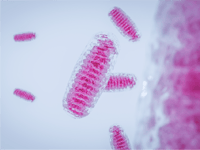 It is always a thrill and a privilege to share our customers' success stories with you, particularly when they feature ABclonal's products in their research publications. Over the past year, we have seen many citations of our reagents in multiple journals, showcasing the partnership ABclonal maintains as a trusted lab partner across a wide range of disciplines. In this entry, we will highlight some of the catalog and custom antibody products our valued customers used to generate recent publication-quality research that adds to our collective understanding of biology!
It is always a thrill and a privilege to share our customers' success stories with you, particularly when they feature ABclonal's products in their research publications. Over the past year, we have seen many citations of our reagents in multiple journals, showcasing the partnership ABclonal maintains as a trusted lab partner across a wide range of disciplines. In this entry, we will highlight some of the catalog and custom antibody products our valued customers used to generate recent publication-quality research that adds to our collective understanding of biology!
Improving Experimental Techniques
In our first study, which is actually also a protocol report, the authors from Johns Hopkins attempted to overcome the challenge of labeling hipoxia-inducible factors (HIF) in samples. The poor vascularization in developing tumors results in hypoxic conditions as the aberrant growths struggle for oxygen, and the study of HIF1𝛂 and HIF2𝛂 is important to the understanding of these phenomena. Due to the rapid turnover rate of HIFs under normal oxygen conditions, the authors developed a new methodology to stain HIFs such that they could simultaneously image HIF1𝛂 and HIF2𝛂 in a tissue sample. The representative images to demonstrate their technique shows robust signal using ABclonal's HIF2𝛂 antibody, which is currently being reworked to provide an even better antibody product for future research. In the meantime, we have other products available for the study of hypoxia, many of which have also been used in published research. We are pleased and honored to have been part of this process improvement!
Source: Oza HH & Gilkes DM (2024) "Multiplex Immunofluorescence Staining Protocol for the Dual Imaging of Hypoxia-Inducible Factors 1 and 2 on Formalin-Fixed Paraffin-Embedded Samples." Hypoxia, Methods in Molecular Biology 2755 (Epub).
Vesicular Trafficking and Mitosis
 We really enjoy this new era of broad collaboration across institutions throughout the world, and this study exemplifies that synergizing of minds perfectly, with contributors from the United States, Canada, and China banding together to study an intriguing mechanism in prostate cancer. As one of the most prevalent cancers among males, metastatic prostate cancer incidence has risen even as medical science has helped to reduce mortality. In this case, the researchers focused on androgen receptor negative prostate cancers with neuroendocrine features, in which the only treatment is aggressive chemotherapy. The targets of the study were CXCR7, a chemokine receptor associated with vesicular transport, and 𝛃-arrestin (also known as ARRB2), which is recruited by CXCR7 to facilitate downstream signaling and mitosis via Aurora Kinase A. The research was helped in part by ABclonal's ARRB2 antibody and Universal SYBR qPCR kit. Hopefully this research will lead to less invasive therapies that can target this mechanism in this group of prostate cancer patients.
We really enjoy this new era of broad collaboration across institutions throughout the world, and this study exemplifies that synergizing of minds perfectly, with contributors from the United States, Canada, and China banding together to study an intriguing mechanism in prostate cancer. As one of the most prevalent cancers among males, metastatic prostate cancer incidence has risen even as medical science has helped to reduce mortality. In this case, the researchers focused on androgen receptor negative prostate cancers with neuroendocrine features, in which the only treatment is aggressive chemotherapy. The targets of the study were CXCR7, a chemokine receptor associated with vesicular transport, and 𝛃-arrestin (also known as ARRB2), which is recruited by CXCR7 to facilitate downstream signaling and mitosis via Aurora Kinase A. The research was helped in part by ABclonal's ARRB2 antibody and Universal SYBR qPCR kit. Hopefully this research will lead to less invasive therapies that can target this mechanism in this group of prostate cancer patients.
Source: Gritsina et al. (2023) "Chemokine receptor CXCR7 activates Aurora Kinase A and promotes neuroendocrine prostate cancer growth." J Clin Invest 133(15):e166248 (Epub).
Metabolism, Cell Death, and Inflammation
 All cells need energy and nutrients to survive, and there are hunger and metabolic stress signals to help ensure their survival under certain starvation conditions. However, prolonged metabolic stress can induce cell death and tissue damage. One of the chief energy sensors is adenosine monophosphate-activated protein kinase, or AMPK, which helps to maintain cell survival during metabolic stress. The research collaboration from Boston that includes scientists from Harvard Medical School illustrate a link between AMPK activity and receptor-interacting protein kinase 1 (RIPK1), a factor in cell death pathways and the inflammatory response. Starting with their observations in mouse cell lines and animal models, they identified a key serine residue at position 415 that could be phosphorylated. ABclonal was tasked to produce an antibody that specifically identifies the phosphorylation on the human homolog at serine 416. Taken together and with the help of ABclonal's antibody expertise, the results indicated a novel link between AMPK activity and control of RIPK1, which in turn regulates cell death and inflammation under short term energy stress conditions.
All cells need energy and nutrients to survive, and there are hunger and metabolic stress signals to help ensure their survival under certain starvation conditions. However, prolonged metabolic stress can induce cell death and tissue damage. One of the chief energy sensors is adenosine monophosphate-activated protein kinase, or AMPK, which helps to maintain cell survival during metabolic stress. The research collaboration from Boston that includes scientists from Harvard Medical School illustrate a link between AMPK activity and receptor-interacting protein kinase 1 (RIPK1), a factor in cell death pathways and the inflammatory response. Starting with their observations in mouse cell lines and animal models, they identified a key serine residue at position 415 that could be phosphorylated. ABclonal was tasked to produce an antibody that specifically identifies the phosphorylation on the human homolog at serine 416. Taken together and with the help of ABclonal's antibody expertise, the results indicated a novel link between AMPK activity and control of RIPK1, which in turn regulates cell death and inflammation under short term energy stress conditions.
Source: Zhang et al. (2023) "Metabolic orchestration of cell death by AMPK-mediated phosphorylation of RIPK1." Science 380:1372-1380.
Of Mitochondria and Viruses
Our customer from Northwestern University tasked ABclonal to create an antibody against a full length F17 protein from poxvirus for their study of how this virus can disrupt host antiviral responses. Since poxviruses replicate in the cytoplasm, they should theoretically be detectable by the host innate defenses and eradicated immediately, but they are able to persist and infect the cells despite this exposed replication. ABclonal's custom F17 antibody was used in Western blotting experiments that supported the elucidated mechanism, which involves the poxvirus F17 protein localizing to mitochondria to disrupt glycolysis and thus inhibit antiviral activity.
Source: Meade et al. (2023) "The poxvirus F17 protein counteracts mitochondrially orchestrated antiviral response." Nat Commun 14:7889 (Epub).
How ABclonal Can Help
In addition to providing high-quality, cost-effective reagents and custom services, ABclonal works to save you money down the line when you turn your research into publications! If you have published with ABclonal products featured in your research, please visit our citations promotional page to submit your articles and you can earn a 25% off voucher on catalog products. Thank you for being our customers, and here's to us working together to grow the global knowledge base and helping humanity!


